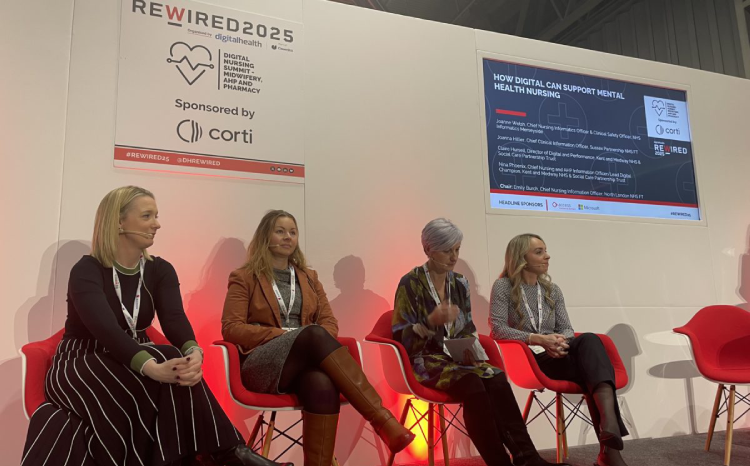Mobile health and apps news in brief
- 17 May 2019

This month’s mobile app news includes mental health apps topping the list of most frequently used in Salford Royal’s own app library and a survey which found patients’ are less likely to chose video consultations with their GP, despite them being offered regularly.
Mental health apps are the most commonly used in Salford’s app library
Apps supporting people with anxiety, stress, eating disorders, sleeping problems, depression and other mental health problems are the most frequently downloaded in the newly launched Salford app library.
Global Digital Exemplar (GDE) Salford Royal NHS Foundation Trust launched it’s An App a Day library in February in collaboration with app safety testing company ORCHA.
Exercise and hobby-based apps – which can also have a proven positive benefit on mental health – are also popular.
This mental health awareness week the trust is encouraging more patients to sign up to the app if they are struggling.
Dr Jessica Dean, consultant clinical psychologist, said: “As psychologists, we do a lot of work with patients in relation to managing their thoughts and feelings. One of the ideas we had was that using apps in addition to our talking based therapies would be a step forward in our treatments.
“There can however be dangers associated with using apps that haven’t been well scrutinised, particularly in the area of mental health.
“The information and advice we provide to patients (be it an app or verbal advice) is quite powerful, especially when people are feeling emotionally vulnerable, so making sure that the apps we recommend are of good quality is therefore very important.
“The new ORCHA website adds a different dimension as it helps therapists to understand if an app is safe to use, or if the information it contains is accurate and well validated.”
Each app is subjected to the seven stages of the ORCHA review process to investigate how good, secure and user-friendly it really is, and to assess any potential risks it may hold, before being given a clear and transparent review score.
Fitness apps should be prescribed to help patients recover from cancer
Fitness apps should be prescribed by clinicians to help patients recovering from cancer increase their physical activity levels, new research in the Journal of Cancer Survivorship reports.
In the first ever study of its kind researchers from the University of Surrey and Universidad de Oviedo in Spain evaluated fitness apps and their suitability for helping cancer survivors increase their physical activity
Clinical guidance recommends physical activity and exercise for those recovering from cancer to improve quality of life, reduce fatigue and lessen on-going symptoms. Smartphone fitness apps could provide a form of ‘virtual’ exercise supervision to patients, but cancer clinicians often lack confidence in what to recommend, as evidence on their quality and content is limited.
One fifth of the 67 fitness apps examined contained content suitable for people affected by cancer showing that they could be an effective tool in helping to improve physical activity.
Jo Armes, reader in cancer care and lead for digital health at the University of Surrey, said: “Fewer than 25 per cent of cancer survivors meet physical activity guidelines which is concerning. Not only will physical activity help improve the quality of life of survivors, it lessens their risk of developing new conditions such as osteoporosis or diabetes.
“However, there is currently little in place to help those recovering from cancer to increase physical activity levels. With over 80 per cent of the adult population owning a smart phone, fitness apps could potentially fill this void by providing easily accessible instructions, helping them to monitor their progress and set goals for themselves.”
Jenny Harris, research fellow at the School of Health Sciences at the University of Surrey, added: “Clinicians are often hesitant to recommend fitness apps to help cancer survivors increase physical activity levels, as they are unsure of the quality and suitability of the information provided.
“Our ongoing research in this area has found that there are suitable fitness apps to help increase activity levels and this will help equip clinicians with the knowledge and confidence in prescribing them, helping patients to benefit from the positive impact of physical activity.”
Survey reveals low demand for video consultations
Few patients choose video consultations when offered a choice of ways to talk to their GP, according to a survey by askmyGP.
The online consultation provider looked at data from 21 practices and found that that 25% of patients expressed a preference for a face-to-face appointment, 28% preferred to be contacted by secure message and 47% by phone.
Patients requested a video consultation in only 0.1% of cases.
Steve Black, data analyst at askmyGP, said: “The data showed surprisingly low demand for video consultations, despite recent publicity about video access to GPs.
“Remote access to GP services by message and phone, rather than traditional face-to-face appointments, is proving to be more popular among patients than we had anticipated.”
Dr Hugh Reeve, a GP in Grange-over-Sands, Cumbria, said: “We have been using askmyGP to offer our patients the option to choose between consultation by phone, secure message, face-to-face or video since February.
“Our patients tell us they have found the new contact system excellent, saving them from taking time out of work to attend the surgery.
“For the practice team it means reduced pressure for appointment slots allowing us to improve our caseload management as well as our own work-life balance.”
Health and wellbeing consultation group launches mental health app
To mark Mental Health Awareness week this week Punter Southall Health and Protection has launched its Havensrock Thrive app, a new wellbeing app designed to help employees manage their mental health.
It’s a cost-effective app available to employers who want to offer their employees a practical and discrete app to monitor their mental health.
Users can monitor their mood daily and record reasons for changes in their mood. Based on their results the app will recommend different activities to help.
Developed by psychiatrists and psychologists, Havensrock Thrive will help employees prevent and manage stress, anxiety and other common mental health conditions.
It offers clinically-proven tools and techniques that can be accessed 24/7 and provides access to confidential and dedicated practical advice and emotional support.
Any employee who needs additional support has immediate access to one-on-one support from a specialist RedArc mental health nurse, in an exclusive arrangement that is not available anywhere else. The RedArc nurse provides long-term support to help employees recover as quickly as possible and can also refer them to other services, if appropriate.
Kim Horsfall, senior group risk consultant at Punter Southall Health and Protection, said: “Our Havensrock Thrive app meets the requirements of those involved in providing and receiving mental health support – whether that is prevention, early detection or immediate intervention. We’ve partnered with RedArc to provide the human intervention because of their proven track record and expertise in supporting mental health.”
Christine Husbands, managing director of RedArc Nurses, added: “Havensrock Thrive enables employees to take responsibility for their own mental health and benefit from tailored support, delivered via the app and by trained professional nurses when needed.
“The app supports the mental health of the workforce at all stages, from simple exercises and techniques to prevent problems from arising, to early detection, coaching and guidance, mental health expertise and appropriate therapy designed to help employees get back to their best.”
New interactive service provides patient’s with reliable health advice
Cognitant Group has launched a new digital health service that allows patients to view information recommended or prescribed by their doctor, nurse or pharmacist.
The service uses 3D graphics to provide explanations about health, disease and treatment.
It is available for patients to view on smartphones and other devices, including virtual reality headsets. This will shape the future of healthcare by allowing patients to access quality information that will ensure more effective use of treatment methods and medication.
It also aims to better explain complicated health information to patients.
Dr Tim Ringrose, chief executive of Cognitant Group, said “Prescribed 3D health information has the potential to transform the management of long-term chronic illnesses.
“Our services enable patients to better self-manage their condition, understand the reason for their medication and the most effective way to manage their health.”
Prof Anoop Chauhan, consultant respiratory physician and director of research and innovation at Portsmouth Hospitals NHS Trust, added: “There is a huge unmet need in patient education for long term conditions, and the solutions offered by Cognitant Group strengthen the armoury of every clinician that will allow them to improve healthcare through bespoke, digital patient education.”
App-based back pain treatment helps patients recover
A digital therapeutics company, Kaia Health, has developed an app-based therapy programme for patients with non-specific lower back pain.
A study published in NPJ Digital Medicine found patients using the app reported significantly lower pain than those in a control group treated with physiotherapy and online education.
The app creates accessible, evidence-based treatments for back pain.
Dr Thomas Tölle, head of pain medicine at Technical University Munich and principal investigator of the study, said: “This study can help add to the growing body of evidence that generally supports the use of multimodal treatments for chronic conditions.
“Within this study, we saw a notable benefit for people managing low back pain when delivering multimodal treatment through the digital modality of the smartphone, as is done in the Kaia app.”
Konstantin Mehl, founder and chief executive at Kaia Health, added: “As a company, we want to support the improvement of the current standard of care for people living with back pain.”
The company plans to launch a similar US-based study to look at the use of the app for managing back pain.




